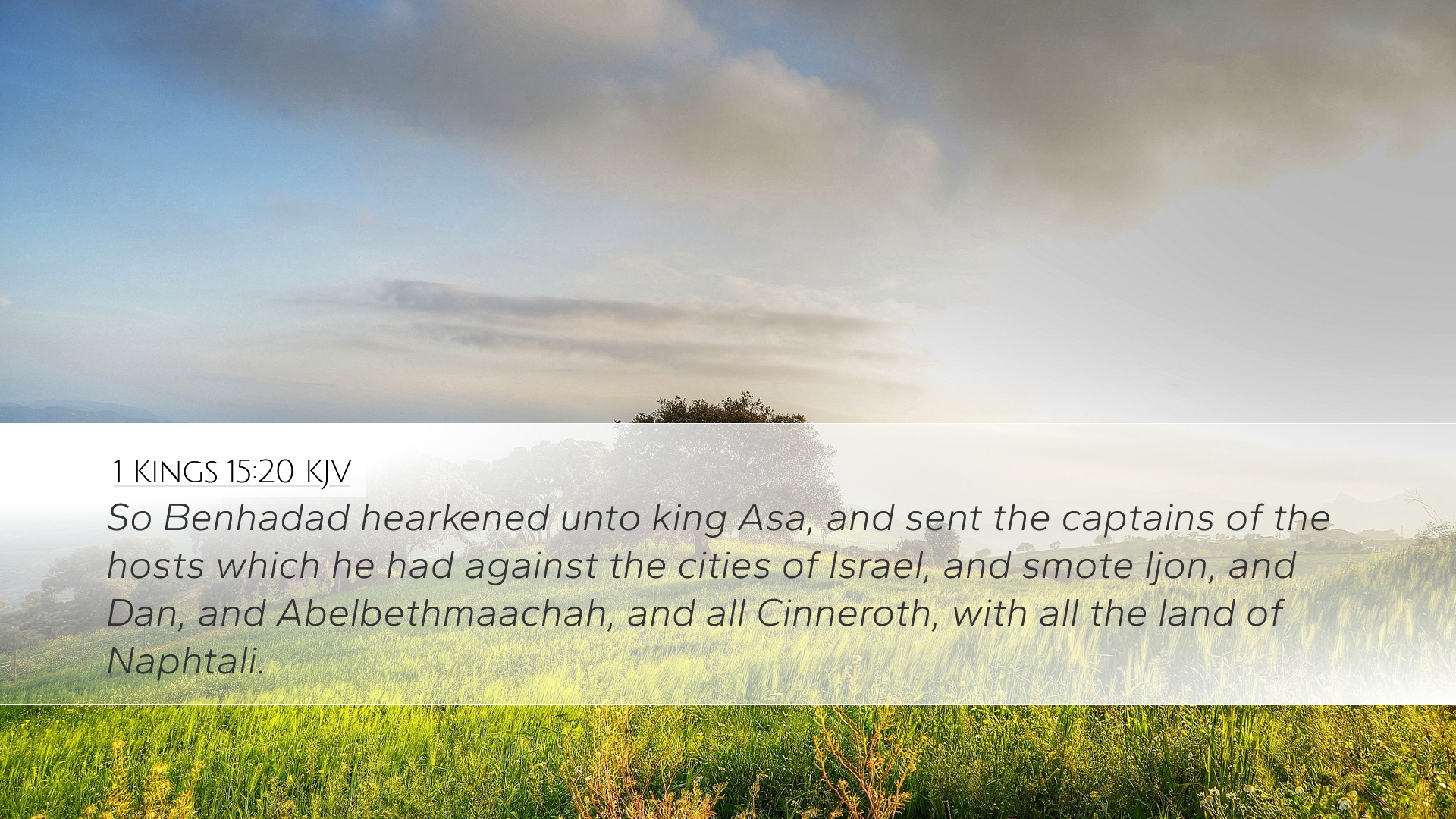Commentary on 1 Kings 15:20
Verse Text: “So Ben-hadad hearkened unto King Asa, and sent the captains of the hosts which he had against the cities of Israel; and smote Ijon, and Dan, and Abel-maim, and all the store cities of Naphtali.”
Introduction
The passage of 1 Kings 15:20 is situated in the historical context of the divided kingdom of Israel, focusing on King Asa of Judah and his strategic alliance with Ben-hadad of Syria to confront the kingdom of Israel. This verse encapsulates both a moment of political maneuvering and a divine plan unfolding amid historical events. Understanding this verse requires an exploration of its historical, theological, and moral implications derived from public domain commentaries.
Historical Context
Matthew Henry's Commentary: Henry emphasizes the significance of this period in Israel's history. Asa, a righteous king, contrasts with his predecessors. Israel, under King Baasha, had fortified the city of Ramah to inhibit trade and communication with Judah. Asa sought help from Ben-hadad, prioritizing political stability over reliance on God, which signals a shift in governance and spiritual trust.
Albert Barnes' Notes: Barnes discusses the historical backdrop of King Asa’s reign and the dynamics between Israel and Judah. The lineage of conflict necessitated alliances, and Asa's request for military assistance from Ben-hadad reflected political wisdom yet raised questions about faith and reliance on God versus human alliances.
Theological Insights
Adam Clarke's Commentary: Clarke reflects on the sovereignty of God in the affairs of men. Though Asa sought help from a foreign king, the underlying implication is that God remains in control, orchestrating events for His purposes. This duality of human action and divine providence is prominent throughout biblical narratives.
Divine Providence Over Human Affairs
In considering the passage, it is visible that while Asa makes a tactical decision influenced heavily by political circumstances, God's providence remains overarching. The involvement of Ben-hadad was not random; God utilized this situation to further His divine plan regarding Israel and Judah.
Righteousness versus Political Expediency
Henry notes the moral challenges posed by Asa’s choices. While he is recognized for his reforms and efforts to return Judah to fidelity to God, his political alliances prompt discussion about the balance between faith and pragmatism. Asa's reliance on Ben-hadad can be interpreted as a failure of faith, demonstrating the human tendency to revert to earthly solutions in times of distress.
Lessons for Leaders and Believers
There are vital lessons that can be drawn from this text for pastors, students, and theologians.
- The Importance of Seeking God: Despite the evident military threat from Israel, Asa’s first step should have been to seek God’s intervention rather than making a political alliance. This serves as a reminder for leaders to prioritize divine guidance above worldly counsel.
- Understanding Consequences: While Asa experienced short-term success through his alliance, the long-term implications should not be overlooked. Relying on human strategies can lead to a drift away from reliance upon God.
- Faith versus Fear: Asa’s fear of Baasha led him to make a decision that ultimately distracted him from God’s sufficiency. Believers today must recognize the subtle influences of fear and trust God’s promises during adversity.
Conclusion
The narrative encapsulated in 1 Kings 15:20 provides a rich tapestry of historical significance, theological insights, and practical applications. It challenges leaders, scholars, and believers to consider deeply the nature of their alliances and the core of their faith amidst conflicts. King Asa's story illustrates the complexities of human decision-making within God’s sovereign plan, highlighting the crucial necessity of grounding actions in faith rather than mere political strategy.


